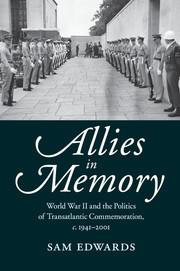Description
Allies in Memory
World War II and the Politics ofTransatlantic Commemoration, c.1941–2001
Studies in the Social and Cultural History of Modern Warfare Series
Author: Edwards Sam
A fresh perspective on World War II commemoration that identifies the central place of war memory in post-1945 transatlantic relations.
Language: English
Subject for Allies in Memory:
Approximative price 40.64 €
In Print (Delivery period: 14 days).
Add to cart
Allies in Memory
Publication date: 03-2018
Support: Print on demand
Publication date: 03-2018
Support: Print on demand
Approximative price 101.56 €
In Print (Delivery period: 14 days).
Add to cart
Allies in Memory
Publication date: 03-2015
308 p. · 15.8x23.5 cm · Hardback
Publication date: 03-2015
308 p. · 15.8x23.5 cm · Hardback
Description
/li>Contents
/li>Biography
/li>
Amidst the ruins of postwar Europe, and just as the Cold War dawned, many new memorials were dedicated to those Americans who had fought and fallen for freedom. Some of these monuments, plaques, stained-glass windows and other commemorative signposts were established by agents of the US government, partly in the service of transatlantic diplomacy; some were built by American veterans' groups mourning lost comrades; and some were provided by grateful and grieving European communities. As the war receded, Europe also became the site for other forms of American commemoration: from the sombre and solemn battlefield pilgrimages of veterans, to the political theatre of Presidents, to the production and consumption of commemorative souvenirs. With a specific focus on processes and practices in two distinct regions of Europe ? Normandy and East Anglia ? Sam Edwards tells a story of postwar Euro-American cultural contact, and of the acts of transatlantic commemoration that this bequeathed.
Introduction; Part I. Remembrance and Reconstruction, c.1917–69: 1. Old World and New World: interwar transatlantic commemoration, c.1917–41; 2. 'Here we are together': air war and the anglicisation of American memory, c.1941–63; 3. 'These memories shall not be forgotten': D-Day and transatlantic memory, c.1944–69; Part II. Americanisation and Commercialisation, c.1964–2001: 4. 'It looks so different now': veterans' memory, c.1964–84; 5. 'The last good war': Vietnam, victory culture and the Americanisation of memory, c.1964–84; 6. 'One last look': the commercialisation of memory, c.1984–2001; Conclusion; Bibliography; Index.
Sam Edwards holds a Ph.D. in History from Lancaster University. His current research engages with transatlantic relations, commemoration and memory, and the cultural history of twentieth-century conflict. He has previously published essays discussing various aspects of twentieth-century war commemoration, and he is co-editor of a volume exploring the place of D-Day in international remembrance, D-Day in History and Memory: The Normandy Landings in International Remembrance and Commemoration (2014). Edwards is keenly involved in various forms of community engagement, including public lecturing and schools' outreach activities, and he is frequently contacted by media outlets for informed opinion on topics connected to his research interests. In 2013, he delivered a guest talk for BBC Radio 4 on the subject of the centennial of the First World War. Prior to becoming a Lecturer in American History at Manchester Metropolitan University, Edwards was Fulbright Distinguished Scholar at the University of Pittsburgh and he remains a Fulbright alumnus. To date, his research has been funded by grants and awards from the Economic and Social Research Council, the British Association of American Studies, the United States Army Military History Institute, and the US-UK Fulbright Commission.
© 2024 LAVOISIER S.A.S.
These books may interest you

Remembering Asia's World War Two 50.12 €

Remembering Asia's World War Two 160.25 €


